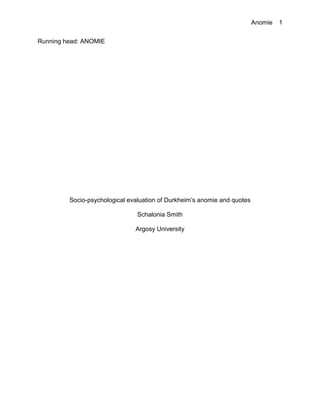
Anomie Schalonia Smith
- 1. Running head: ANOMIE<br />Socio-psychological evaluation of Durkheim’s anomie and quotes<br />Schalonia Smith<br />Argosy University <br />Socio-psychological evaluation of Durkheim’s anomie and quotes<br />Emile Durkheim introduced the concept of anomie in the late 19th century CITATION Def07 Def89 1033 (Deflem, 2007; Deflem, 1989). Durkheim theorized that an anomie is “…a condition in society when social and moral norms multiply, become ambiguous or unclear, or disappear” (Argosy University Materials, 2010, Brilliance, p. 3). Without the presence of normality and social regulation, individuals are unable to function psychologically according to Durkheim’s theories. Durkheim gave special attention to suicide in his research. During his research of suicide, Durkheim distinguished anomic suicide. “Durkheim argued that anomic suicide takes place when normative regulations are absent, such as in the world of trade and industry (chronic anomie), or when abrupt transitions in society lead to a loss in the effectiveness of norms to regulate behavior (acute anomie)” CITATION Def07 144 1033 (Deflem, 2007, p. 144). This paper will approach two of Durkheim’s quotes on suicide from a socio- and psychological standpoint.<br />Greed quote<br />From top to bottom of the ladder, greed is aroused without knowing where to find ultimate foothold. Nothing can calm it, since its goal is far beyond all it can attain. Reality seems valueless by comparison with the dreams of fevered imaginations; reality is therefore abandoned. (as cited in Argosy University Materials, Assignment 2, italics in original) <br />In this quote, Durkheim refers to greed causing suicide. Durkheim appears to be saying greed causes delusions of grandeur that cause an individual to detach from reality to pursue unattainable goals. Durkheim, according to the theory of anomie, would theorize an abrupt change within society would cause the disruption in regulation of individual’s delusions of grandeur CITATION Def89 1033 (Deflem, 1989). Durkheim theorized that society must regulate individual desires and motivations. “Since unlimited desires are insatiable, a force must regulate man's passions: man's needs must be sufficiently proportioned to his means” CITATION Def89 627 1033 (Deflem, 1989, p. 627). <br />From a sociological standpoint, Durkheim is stating that social greed, when unregulated by society, leads to goals of unattainable wealth that reality cannot produce. Members of society from all economic classes strive to improve their economic standing. However, when these goals become unregulated by society, reality is abandoned and suicide is the only possible outcome. <br />The psychological theories of motivation can be applied to Durkheim’s quote as well. When the achievement motive is applied to personal financial gain, Durkheim’s quote highlights human motivation. “The achievement motive is the need to master difficult challenges, to outperform others, and to meet high standards of excellence” CITATION Way01 1033 (Weiten, 2001). When employees and higher ups are on a fast track to financial gains, their motivations may misconstrue reality. Employers that are lower on the ladder may feel alienated and unable to reach to financial success of those above them. Therefore, employees may be unrealistically motivated to achieve the success of higher up employees. In contrast, higher up, successful individuals may feel alienated by their financial gains. <br />The recent recession in the stock market lends value to Durkheim’s claims. Andrew Clark (2009) reported six suicides that were directly caused by financial losses in extremely wealthy men. With the prior success in the stock market, businesspersons were often controlled by greed with no limits. When the stock market plummeted, the individuals no longer had access to unlimited wealth. Clark (2009) stated, “Sudden, dramatic slumps in fortunes caused by the credit crunch can take a tragic toll on high-flying businessmen accustomed to a life of success” CITATION Cla09 28 1033 (p. 28). This can be considered a modern day version of Durkheim’s before mentioned quote. <br />Comfort quote<br />quot; It is too great comfort which turns a man against himself. Life is most readily renounced at the time and among the classes where it is least harshquot; (as cited in Argosy University Materials, Assignment 2, italics in original). <br />In this quote, Durkheim appears to refer to the social classes in which comfort is readily available. Though achievement goals vary among individuals, achievement is a stable aspect of personality CITATION Way01 1033 (Weiten, 2001). These individuals may feel alienated from society, as the majority of society has not reached levels of economic comfort. When higher classes reach their goals and live in comfort, the individuals may feel their achievements have been reached and there is no reason to continue living. <br />Conclusion<br />Durkheim rightly theorized that without the presence of normality and social regulation, individuals are unable to function psychologically. His research discovered that unattainable goals and the lack of social regulation are factors of suicidal causes. Recent suicides by high-ranking members of society caused by an economic downfall lend credit to Durkheim’s theories. Achievement motivation also appears to further support Durkheim’s theories. Durkheim’s theorizes appear to be applicable to past and present suicides. <br />References<br />Argosy University Materials. (2010). Module 5. Retrieved from, https://mycampus.argosy.edu/ <br /> BIBLIOGRAPHY 1033 Clark, A. (2009, January 9). Human cost of recession: Six deaths as losses mount. The Gaurdian , p. 28. Retrieved from, http://sks.sirs.com.wf2dnvr15.webfeat.org/cgi-bin/hst-article-display?id=SARGOSYPROX-0-6767&artno=0000289035&type=ART&shfilter=U&key=&title=Human%20Cost%20of%20Recession%3A%20Six%20Deaths%20As%20Losses%20Mount&res=Y&ren=Y&gov=N&lnk=N&ic=N <br />Deflem, M. (2007). Anomie. In G. Ritzer (Ed.), The Blackwell Encyclopedia of Sociology (pp. 144-1446). Oxford: Blackwell Publishing. Retrieved from, http://www.cas.sc.edu/socy/faculty/deflem/zanomiency.html<br />Deflem, M. (1989). From Anomie to anomia and anomic depression: A Sociological critique on the use of anomie in psychiatric research. Social Science and Medicine , 29 (4), 627-634. Retrieved from, http://www.cas.sc.edu/socy/faculty/deflem/zanomie.htm <br />Weiten, W. (2001). Psychology themes and variations (5th ed). Australia: Wadsworth.<br />